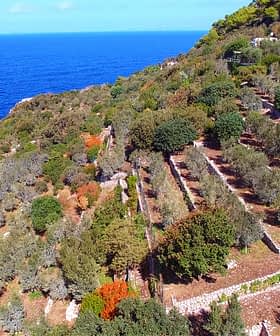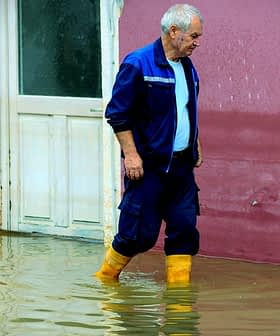AIFO, the Italian Association of Olive Oil Millers, held an all-day workshop on March 23rd at Rome’s San Sebastiano al Palatino. The charming Palatine Hill church complex feels as if it’s in the remote countryside, but is, in fact, close to the superhighway-like street that connects the Colosseum to Piazza Venezia. The group, made up of olive oil producers with small to medium sized businesses, gathered to discuss how to position high quality extra virgin olive oil in a world where low cost is most valued.
Olives in Puglia are being ripped out to make room for photovoltaic farms. This makes me shudder
The group heard from members, speakers from the academic world, government agency representatives, and consultants. Everyone seemed to agree that differentiation from mass-market brands was key, and that it would take a long time and a lot of hard work for high quality olive oil to garner the price it deserves. There was also a spirited discussion of how the byproducts of olive oil extraction should be treated.
Piero Gonnelli, president and founding member of AIFO, in order to highlight the consequences of low prices on the sector said, “Today, olives in Puglia are being ripped out to make room for photovoltaic farms. This makes me shudder. In Tuscany 50 to 60 percent of the olive groves have been abandoned.” Gonnelli, who was profiled by the Olive Oil Times, grows olives and produces and bottles oil in Tuscany. The last figure is particularly preoccupying since Tuscan olive oil carries a premium over oils from other regions.
Italian shoppers buy a liter of olive oil, on average, every ten to fifteen days. Consumers are buying enough oil but, according to AIFO members, it lacks quality. Mauro Loy, a marketing expert and former supermarket chain executive, reported that some 85% of extra virgin olive oil is purchased at supermarket chains. Selection is largely guided by what’s on sale. AIFO members want consumers to have the choice between their elevated quality oils and the standard extra-virgin olive oil of the big brand packagers. (Italian consumers already have the choice of two types of milk, standard and high quality.) AIFO members are not only looking at Italian consumers, but are studying ways of reaching expanding markets, such as the US, the Far East, and Russia.
Giampaolo Sodano, vice president of AIFO, whose profile appeared in the Olive Oil Times and who chaired the event, explained that the seminar leads up to the annual meeting in May where documents will be assembled in order to lobby the European Parliament in Brussels. AIFO is particularly interested in receiving recognition of the profession Mastro Oleario or Master Oil Producer. In the same vein, some members, such as Gonnelli, believe the word and concept artisanal best describes what they are doing and it should be used to connect with consumers. Gonnelli noted that consumers are already familiar with the artisanal beer and artisanal pasta.
Professor Maurizio Servili of Perugia’s university, made the point that differentiation and the concept of Italian high quality was essential since too liberal international standards were being undercut by even more watered down standards introduced by individual countries. Professor Servili said, “Argentina is now a member of COI (International Olive Council), all the same, Argentina has made itself a nice little standard, allowing for extra virgin olive oil to have a linolenic acid of 1.5 percent instead of the international limit of 1 percent. They’ve set themselves standards which allow for campesterol which can be at 4.5 percent instead of the international limit of 4 percent.” Servili followed this by saying that the new standards opened the door for adulteration with safflower oil, and that Australia had created standards similar to Argentina’s. According to him, it will devolve into a free-for-all.
Various speakers discussed what defines “High Quality Italian”. Some, but not all, DOP and IGP would be considered for the category. A number of speakers voiced the opinion that there were geographically indicated oils that were not sufficiently good for the category. Objective chemical analysis will be critical in vetting the oils. Sodano said that consumers should be presented with clear labels that “should give a precise (minimum allowable) number of polyphenols.” This was considered important in regard to health since high quality oil is richer in health improving properties than a standard extra virgin olive oil.
Professor Massimo Pizzichini gave an interesting presentation on his projects and patents involving the capture of polyphenols from the waste created during olive oil extraction. He spoke of polyphenols and their role in the life of olive trees, which include being a preservative, and also protect the tree and fruit from the olive fly and harmful bacteria. At the professor’s entrepreneurial company PhenoFarm, pomace and vegetation water, which contain 98 percent of the polyphenols available from olive oil extraction, are isolated through the use of membranes. He foresees strong demand for polyphenols from food, pharmaceutical and cosmetic companies, and chided olive oil producers for not buying into his projects. His anger was met with a hush, gasps, and nervous laughter and kept everyone alert well into the afternoon.









